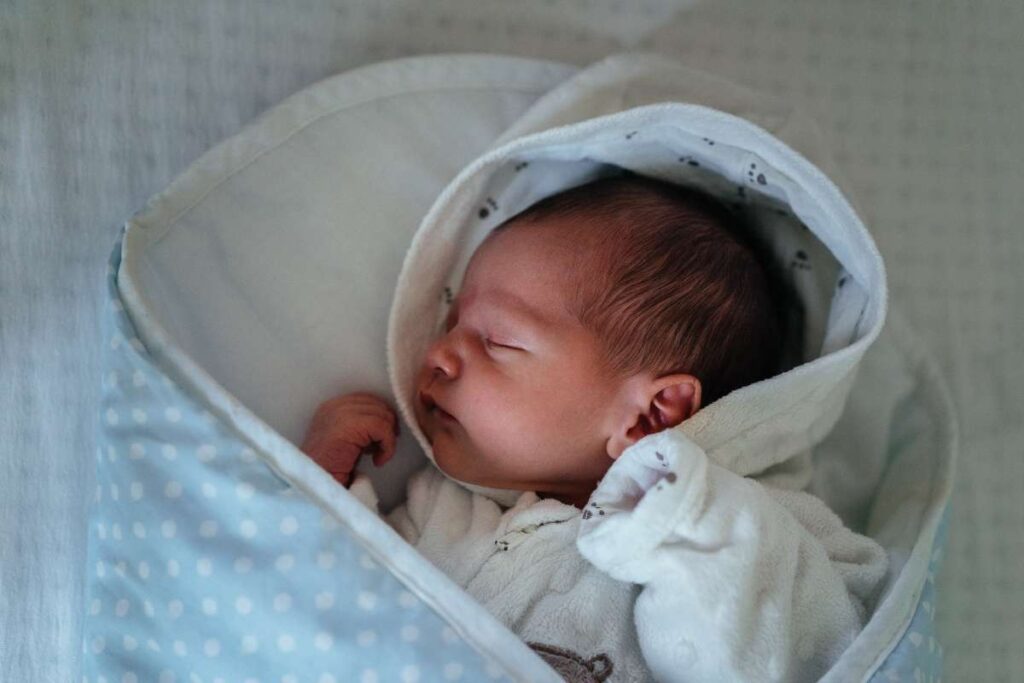The common belief is that if a baby is exhausted, it will go to sleep on its own. Even an exhausted infant may have trouble sleeping, according to pediatric counselors. You may be perplexed as to why your child will not fall asleep despite displaying the classic indicators of exhaustion, such as closed eyes and a drooping head.
When babies get overtired, their parents may find that they fall asleep at the most inopportune times. On the other hand, other parents will see that their infants have a hard time falling asleep when they are overtired.
It's important to follow the guidance of the professional, even if it differs from the many other tips and viewpoints out there. For instance, you may have heard that it's best to keep your infant up all day long so that they can fall asleep easily at night but never wake up throughout the night. However, while this strategy may be successful with grownups, it often backfires when applied to children.
More trouble getting to sleep and staying asleep is a common result of using this technique. Just keep in mind that "sleep breeds sleep." Your infant will sleep better at night if they nap more throughout the day.
Most seasoned parents know it's better to put their kid to bed before they're too exhausted to do so yourself. Healthy Sleep Habits describes this exact method. Dr. Marc Weissbluth, a well-known author, tells parents that "sleep begets sleep."
Your infant will experience stress if they don't get enough sleep or stay awake for too long. Sleep-deprived infants can't stay awake for very long. If that happens, their adrenaline & cortisol levels will rise, making it far more challenging for neonates to calm down and fall asleep after a battle.
The signs of an overtired baby can be obvious at times. It's not always obvious when your infant is overtired, though.
You may not realize you have an extremely tired baby until it's too late, because the indicators are sometimes quite subtle. When dealing with infants who refuse to go to sleep, keep an eye out for the following:
- The infant is having trouble falling asleep.
- They are not sleeping through the night, but rather merely dozing off for little periods.
- The infant isn't getting a good night's rest.
- The infant is in a very irritable mood.
- This decreases the infant's coping mechanisms, making it more difficult for the baby to endure unpleasant experiences.
- The infant has a tendency toward temper tantrums.
Another indicator that your baby may be overtired is if he or she falls asleep unexpectedly during the day. This could happen when your baby is playing or eating.
Even if it's not nap time, the infant might fall asleep. If you're having trouble figuring out how to get your kid on a healthier schedule, our pediatric counselling services may be what you need.
FAQs About Baby Sleep
Overtired babies can be incredibly hard to calm down and get to sleep. Overtired babies also have a harder time staying asleep once they finally settle down. It sounds so contradictory, but overtired babies won't sleep well.
The time it takes for an overtired baby to fall asleep will vary from several minutes to even an hour. According to the National Sleep Foundation's Sleep in America Poll, overtired babies take up to 20% longer to fall asleep.
When your baby becomes overtired, their stress response system goes into high gear, triggering cortisol and adrenaline to flood into their little bodies. Cortisol helps to regulate the body's sleep-wake cycle; adrenaline is the fight-or-flight agent.
So how do you break the cycle of overtiredness and start to pay back that “sleep debt?” Unfortunately, overtiredness can build throughout the day and can set into motion a vicious cycle of early bedtimes and early wakings.
The best way to break the cycle and get those hormones under control is a few nights of early bedtimes. Only 30 to 60 minutes earlier for 3 to 5 days should do the trick. Once the sleep issues are resolved, inch their bedtime back to the normal time by 10 minutes every two nights.
Recognise Your Baby's Sleep Requirements

One way to prevent a cranky infant is to learn his or her specific sleep requirements. Children's sleeping requirements may differ from one to the next, but one basic guideline is their age.
Your two-month-old infant will likely prioritise eating over sleeping for the foreseeable future. During this time, the infant will typically want to eat every two hours. When breastfeeding, this is much more important. The frequency of bottle feedings may decrease as your baby grows.
The newborn will be in deep slumber for roughly 8 to 10 hours each day at this point. This time spent sleeping, however, will not come all at once. So that the infant can eat, you'll need to split the day into three- to four-hour increments.
It's a sad reality that infants have no concept of day and night. Your infant may sleep during the day yet need attention between the hours of 1 and 5.
At three months, the newborn can sleep about six hours at a time. Even if the baby's sleep pattern appears to be developing normally, other aspects of development during the ninth month can disrupt it.
As an example, if you leave the infant alone at bedtime, they may start sobbing until you return.
Unfortunately, their anxiety is preventing them from getting to sleep.
Rocking And Lullabies Can Assist Your Tired Baby In Falling Asleep.
The stress hormone cortisol must be lowered in an overtired infant before sleep can be achieved. People's alertness and energy levels are maintained by the hormone cortisol. Relaxing the senses is an effective way to lower cortisol.
The stress hormone cortisol is reduced when you rock or sing to your infant. Both of these strategies rank high on lists of well-known methods for reducing stress. In addition to singing and rocking, you can also attempt the following sensory calming techniques:
- Swaddling\s\sMassage
- Gentle rocking or swaying motions repeatedly
- Putting the baby to sleep with food
- Subduing the brightness of the lights
- Gently playing music
- White noise from a smartphone app
The overarching goal of these strategies is to reduce stress and prepare the body for sleep. You can take your infant for pediatric counselling if the calming techniques you've tried haven't worked, or if you'd need more specific information about your child's sleep habits.
Maintain The Baby's Cool
Just like adults, infants benefit from a steady and cool temperature when they are trying to sleep. Temperatures between 69 & 73 degrees Fahrenheit are recommended for lulling a newborn to sleep. It's important to keep your kid from getting too hot or too cold, so avoid excessive layering.
Rather than swaddling your infant in bulky clothing, you can save yourself the trouble by putting them in layers. If you dress the infant in layers, you can better control the temperature in the room. If you're at a loss for what to put on your infant, just add an extra layer to what you're wearing.
Your baby may be over-bundled if you notice that they are sweating. Dressing the room appropriately is important, but placing the crib in the appropriate area is also important. It shouldn't be situated in the route of your HVAC system's air ducts.
If you have a child, you probably don't want to subject them to extreme temperatures. Your infant will be startled and disturbed by the sudden change in temperature, making sleep difficult. The baby's crib should be placed away from windows to reduce drafts and outside noise.
Remove The Clutter
Make sure the baby's room is used only for sleeping. We advise you to maintain a plaything-free zone surrounding the crib. Your infant may have trouble falling asleep if there are too many things going on in their crib. They have no concept of the difference between a playpen and a bedroom.
Overtired Baby Symptoms
Babies who don't get enough sleep and stay awake for too long experience a stress response, which causes a rise in adrenaline and cortisol, making it more difficult for them to unwind for bed.
There will be instances when you know your kid is overtired... and sometimes the indicators are more subtle. Here are some qualities to seek out in your infant:
- It's difficult for her to get to sleep at night.
- She prefers short naps to longer ones.
- She isn't a big night owl because of her busy schedule.
- She is quite irritable.
- She has a lower tolerance for discomfort.
- She has more frequent outbursts of emotional instability (in an older baby).
- She has a habit of nodding off at the most inopportune times, such as in her high chair at mealtime or the moment she sits in her stroller, even if it's not naptime.
Additional symptoms of an overtired infant are:
- We were rubbing our eyes and pulling on our ears. Baby may reach for her face in an effort to comfort herself.
- Yawning. Her body is telling her that she's getting sleepy by making her yawn.
- Eyes firmly crossed. It gets difficult to concentrate.
- Ignoring the speaker. Baby may stop paying attention to you and start staring off into space.
- Clinginess. Overtired infants become clinging between the ages of three and twelve months.
- Fussiness. It's possible that your infant is cranky.
- Back arched and wriggling around. As a result, she can give off an awkward vibe.
- Insisting on having one's way. Whether you pick up your baby or put her down, she continues to cry.
- Clumsiness. Babies, in general, become increasingly awkward and unfocused as they age.
- Hyperactivity. She's probably fatigued, but she might act jolly.
- been taking nap times that are shorter than usual. The baby's nap time has been disrupted once again, and you can point the finger at the hormones.
Assist Your Tired Baby In Falling Asleep

- Babies' rapid physical, emotional, & mental development necessitates a great deal of sleep.
- The baby is overtired and exhausted. Your infant's health could be negatively impacted by his or her chronic overtiredness.
- If a baby is overtired, falling asleep becomes difficult.
- To prevent your infant from becoming overtired, you should establish a regular sleep routine for him or her.
- Your baby's body goes into overdrive when it's overtired, and it can be hard to interrupt this pattern. It's a terrible ordeal for the newborn and the whole family.
When she's sleeping, your baby seems so peaceful. Even though her mind is somewhere else, her body is working overtime. Her abdominal muscles and tissues are expanding and contracting, constructing and repairing themselves with every breath she takes. While your baby is sleeping, her brain is still processing the information she took in while awake.
The best intentions of parents often result in keeping their infants up past their natural bedtime despite the fact that sleep is essential to their healthy growth and development. Nap deprivation will result in bad sleep habits and also an overtired baby, not greater nighttime rest. To prevent your baby from becoming overtired, get to know her cues and wake windows, which will vary with her age.
Remember that your infant might not be so understanding if you linger in chat with your pals or make an extra trip to the grocery store. Focus on the time and the end goal of a rested and content infant.
If you've never seen an extremely tired baby, you don't know the havoc that lack of sleep can wreak on a person's day until you do. Oversleepiness is a terrifying monster that you should do whatever to prevent. Certainly not your little one.
How To Keep Your Baby From Being Tired
Be careful to provide plenty of time for your baby to get the sleep she needs. Here's how so much sleep your infant needs, organized by month:
- Between 14 and 17 sleep hours per day is ideal for a baby of 1 month. The nighttime portion will be around eight to nine hours (with your baby waking up around every three hours to breastfeed and going back to sleep) as well as the napping portion will be another seven to nine hours.
- A baby of 2 months needs 12-16 hours of sleep per day. Eight to ten hours at night (with feedings every 4 to 6 hours) and 4 to 8 hours during naps is reasonable.
- A 3-month-old needs nine to ten nights of sleep each night (again, with some overnight feeds) and several naps of 90 minutes or more per day.
- There should be a total of 12–15 hours of sleep each day for your infant, including two or three 3- to 4-hour naps during the day and another 10- to 11-hour stretch during night (with fewer feeds overnight).
- Six month old babies should be sleeping nine to eleven hours at night and taking two lengthy naps throughout the day. This means that she can now regularly get between six and eight hours of sleep without waking up.
In an ideal world, you would prevent your child from becoming overtired before it even begins. The following are some things you can do to keep your infant from becoming overtired:
- Keep an eye out for indicators that it's time to sleep. Babies show signs of exhaustion, such as rubbing their eyes, becoming irritable, pulling at their ears or hair, yawning, and so on.
- Establish a nightly regimen that you stick to. This aids in the process of putting the infant to sleep after a period of being awake. In the case of naptime, a condensed version is all that's needed. (But don't do this at home with a brand new baby.)
- Prevent your infant from becoming overstimulated right before bedtime. In the last half-hour or more before bedtime, it's best to place your infant in a calmer environment, away from the radio or radio.
Take preventative measures against oversleeping by following these steps:
- Don't be late. Your baby's wake window is closing, so you should immediately put him or her down for a nap. The trick is to get her ready for bed before she starts showing indications of exhaustion.
- Establish a regular pattern of going to bed and waking up. Your infant will learn to associate the sleepy routine with sleep time:
- Tune in to some soothing tunes or turn on the white noise generator.
- You should not play with or tickle your kid while you are changing her diaper.
- Give a soothing reading of a narrative.
- Rub his back, shoulders, and legs gently.
- Keep a regular sleeping pattern. Maintain a regular schedule for waking up and going to bed. When your happy (but not overtired) infant is having trouble sleeping, you know it's time to make some changes to the routine.
- Allow your infant some quiet time. Rather than calming her, extra rocking & bouncing may excite her.
- Figure out when your infant is most likely to sleep. Learning her routine will assist you in identifying when she's showing signs of fatigue. The American Academy of Pediatrics suggests the following wake-up timings, broken down by age group: In the first few months, it shouldn't take more than 45-60 minutes.
1–2 hours for 4-6 months, 2–3 hours for 3-6 months, 3–4 hours for 12–18 months, and 4–6 hours for 18–24 months.
When your infant is overtired, he or she may start weeping and screaming, which can be upsetting. These tried-and-true techniques are sure to help relax your infant:
- When chatting to your infant, please use a soft voice.
- Find somewhere quiet and dark to take her.
- Keep a neutral attitude and avert your gaze. Make an effort to engage in eye contact with your baby.
- If your infant is showing signs of touch resistance, try laying her on her back.
Conclusion
Paediatric counsellors say that even a weary infant may have problems falling asleep. If your infant takes more naps throughout the day, they'll sleep better at night. Well-known author Dr. Marc Weissbluth advises parents that "sleep begets sleep." Overtired infants have a hard time staying awake. Overtired infants are more prone to tantrums and may require additional care during the day.
To get a cranky baby to sleep, it's important to reduce his or her levels of the stress hormone cortisol. Swaddling and singing are two examples of sensory relaxation practises that have been shown to reduce cortisol levels in infants. Not getting enough sleep triggers a stress reaction in infants, increasing levels of adrenaline and cortisol and making it more challenging for them to relax and get ready for bed. Between the ages of three and twelve months, infants that are overtired tend to become extremely clinging. Overtiredness in your infant might have serious consequences for his or her health.
Create a consistent bedtime schedule for your infant to avoid oversleeping. Babies one month old should get anything from 14 to 17 hours of sleep every day. A child of three months requires nine to ten hours of sleep per night. A baby of six months old should be getting nine to eleven hours of sleep every night and two long naps during the day. You know it's time to switch up the baby's bedtime routine if he or she is having problems falling or staying asleep.
Content Summary
- The common belief is that if a baby is exhausted, it will go to sleep on its own.
- Even an exhausted infant may have trouble sleeping, according to paediatric counsellors.
- You may be perplexed as to why your child will not fall asleep despite displaying the classic indicators of exhaustion, such as closed eyes and a drooping head.
- When babies get overtired, their parents may find that they fall asleep at the most inopportune times.
- On the other hand, other parents will see that their infants have a hard time falling asleep when they are overtired.
- For instance, you may have heard that it's best to keep your infant up all day long so that they can fall asleep easily at night but never wake up throughout the night.
- More trouble getting to sleep and staying asleep is a common result of using this technique.
- Your infant will sleep better at night if they nap more throughout the day.
- Most seasoned parents know it's better to put their kid to bed before they're too exhausted to do so yourself.
- Your infant will experience stress if they don't get enough sleep or stay awake for too long.
- The signs of an overtired baby can be obvious at times.
- It's not always obvious when your infant is overtired, though.
- When dealing with infants who refuse to go to sleep, keep an eye out for the following: The infant is having trouble falling asleep.
- The infant has a tendency toward temper tantrums.
- Another indicator that your baby may be overtired is if he or she falls asleep unexpectedly during the day.
- One way to prevent a cranky infant is to learn his or her specific sleep requirements.
- The frequency of bottle feedings may decrease as your baby grows.
- It's a sad reality that infants have no concept of day and night.
- Your infant may sleep during the day yet need attention between the hours of 1 and 5.
- At three months, the newborn can sleep about six hours at a time.
- Even if the baby's sleep pattern appears to be developing normally, other aspects of development during the ninth month can disrupt it.
- Unfortunately, their anxiety is preventing them from getting to sleep.
- The stress hormone cortisol must be lowered in an overtired infant before sleep can be achieved.
- The stress hormone cortisol is reduced when you rock or sing to your infant.
- You can take your infant for paediatric counselling if the calming techniques you've tried haven't worked, or if you'd need more specific information about your child's sleep habits.
- Just like adults, infants benefit from a steady and cool temperature when they are trying to sleep.
- Rather than swaddling your infant in bulky clothing, you can save yourself the trouble by putting them in layers.
- If you dress the infant in layers, you can better control the temperature in the room.
- Dressing the room appropriately is important but placing the crib in the appropriate area is also important.
- Your infant will be startled and disturbed by the sudden change in temperature, making sleep difficult.
- The baby's crib should be placed away from windows to reduce drafts and outside noise.
- Make sure the baby's room is used only for sleeping.
- She has a habit of nodding off at the most inopportune times, such as in her highchair at mealtime or the moment she sits in her stroller, even if it's not naptime.
- Additional symptoms of an overtired infant are: We were rubbing our eyes and pulling on our ears.
- Whether you pick up your baby or put her down, she continues to cry.
- The baby's nap time has been disrupted once again, and you can point the finger at the hormones.
- Babies' rapid physical, emotional, & mental development necessitates a great deal of sleep.
- The baby is overtired and exhausted.
- If a baby is overtired, falling asleep becomes difficult.
- To prevent your infant from becoming overtired, you should establish a regular sleep routine for him or her.
- Your baby's body goes into overdrive when it's overtired, and it can be hard to interrupt this pattern.
- Focus on the time and the end goal of a rested and content infant.
- Be careful to provide plenty of time for your baby to get the sleep she needs.
- A baby of 2 months needs 12-16 hours of sleep per day.
- In an ideal world, you would prevent your child from becoming overtired before it even begins.
- The following are some things you can do to keep your infant from becoming overtired: Keep an eye out for indicators that it's time to sleep.
- Prevent your infant from becoming overstimulated right before bedtime.
- In the last half-hour or more before bedtime, it's best to place your infant in a calmer environment, away from the radio or radio.
- Take preventative measures against oversleeping by following these steps: Don't be late.
- Your baby's wake window is closing, so you should immediately put him or her down for a nap.
- The trick is to get her ready for bed before she starts showing indications of exhaustion.
- Establish a regular pattern of going to bed and waking up.
- Your infant will learn to associate the sleepy routine with sleep time: Tune in to some soothing tunes or turn on the white noise generator.
- Maintain a regular schedule for waking up and going to bed.
- Figure out when your infant is most likely to sleep.
- Learning her routine will assist you in identifying when she's showing signs of fatigue.






